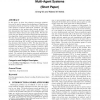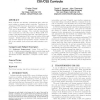1512 search results - page 222 / 303 » Qualitative reinforcement learning |
HICSS
2003
IEEE
14 years 2 months ago
2003
IEEE
Basically, instrumental conditioning is learning through consequences: Behavior that produces positive results (high “instrumental response”) is reinforced, and that which pro...
ICML
2008
IEEE
14 years 10 months ago
2008
IEEE
We present a reinforcement learning architecture, Dyna-2, that encompasses both samplebased learning and sample-based search, and that generalises across states during both learni...
ATAL
2008
Springer
13 years 11 months ago
2008
Springer
In this paper, we show how adaptive prototype optimization can be used to improve the performance of function approximation based on Kanerva Coding when solving largescale instanc...
PPL
2008
13 years 9 months ago
2008
This paper investigates the influence of the interconnection network topology of a parallel system on the delivery time of an ensemble of messages, called the communication scheme...
SIGCSE
2009
ACM
14 years 9 months ago
2009
ACM
Many academic and industry professionals have called for more testing in computer science curricula. Test-driven development (TDD) has been proposed as a solution to improve testi...


